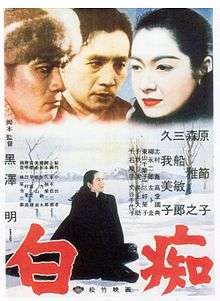The Idiot (1951 film)
The Idiot (白痴, Hakuchi) is a 1951 Japanese film directed by Akira Kurosawa. It is based on the 1869 novel The Idiot by Fyodor Dostoevsky. The original 265-minute version of the film, faithful to the novel, has been lost for many years. A nearly three-hour release, reflecting a 100-minute studio imposed cut, survives as the most complete version of the film available for contemporary audiences.
| The Idiot | |
|---|---|
 Original Japanese poster showing Toshirō Mifune (left), Masayuki Mori (centre) and Setsuko Hara (right) | |
| Directed by | Akira Kurosawa |
| Produced by | Takashi Koide |
| Screenplay by | Akira Kurosawa Eijirō Hisaita |
| Based on | The Idiot by Fyodor Dostoevsky |
| Starring | Setsuko Hara Yoshiko Kuga Toshiro Mifune Masayuki Mori Takashi Shimura Noriko Sengoku |
| Music by | Fumio Hayasaka |
| Cinematography | Toshio Ubukata |
| Edited by | Akira Kurosawa |
Production company | |
| Distributed by | Shochiku |
Release date |
|
Running time | 166 minutes |
| Country | Japan |
| Language | Japanese |
Plot
After narrowly escaping death during the recent war, Kameda returns to Japan from Okinawa, where he has been confined to an asylum. Because he is subject to seizures of epilepsy and emotional instability, he is considered to be mentally ill.
During his journey home, he meets and becomes friends with Akama, who is returning home to receive his inheritance after a long estrangement because of his love for Taeko, who has been the mistress of Tohata since her childhood.
Tohata, fearing disgrace for his abusive treatment of Taeko, has agreed to provide a dowry of Y600,000 to Kayama. In a threatening confrontation, Akama offers him Y1,000,000 not to marry her.
Despised by women and treated as chattel by the other men, Taeko realizes it is only Kameda who sees who she truly is when he looks deep into her soul and tells her “You’re not that kind of person.”
Akama proposes to Taeko, but she delays responding. Akama jealously interprets this to mean that she is really in love with Kameda. His jealousy grows until he ultimately murders Taeko and both men go mad with grief.
Cast
- Masayuki Mori as Kinji Kameda, the idiot (based on Prince Myshkin)
- Toshiro Mifune as Denkichi Akama (based on Rogózhin)
- Setsuko Hara as Taeko Nasu (based on Nastasya Filippovna)
- Yoshiko Kuga as Ayako (based on Agláya Ivánovna)
- Takashi Shimura as Ono, Ayako's father (based on General Epanchín)
- Chieko Higashiyama as Satoko, Ayako's mother (based on Lizavéta Prokófyevna)
- Eijirō Yanagi as Tohata (based on Totskiy)
- Minoru Chiaki as Mutsuo Kayama, the secretary
- Noriko Sengoku as Takako
Production background
The film is in black and white at an aspect ratio of 1.37:1. This was Kurosawa's second film for the Shochiku studio, after Scandal (1950).
It was originally intended to be a two-part film with a running time of 265 minutes. After a single, poorly received, screening of the full-length version, the film was severely cut at the request of the studio. This was against Kurosawa's wishes. When the re-edited version was also deemed too long by the studio, Kurosawa sardonically suggested the film be cut lengthwise instead.[1] According to Japanese film scholar Donald Richie, there are no existing prints of the original 265-minute version. Kurosawa would return to Shochiku later to make Rhapsody in August (1991), and, according to Alex Cox, is said to have searched the Shochiku archives for the original cut of the film to no avail.
"Of all my films, people wrote to me most about this one... ...I had wanted to make The Idiot long before Rashomon. Since I was little I've liked Russian literature, but I find that I like Dostoevsky the best and had long thought that this book would make a wonderful film. He is still my favourite author, and he is the one — I still think — who writes most honestly about human existence."
— Akira Kurosawa[2]
Reception
Rotten Tomatoes reports 78% approval for The Idiot among nine critics, with an average rating of 6.9/10.[3]
References
- Mitsuhiro Yoshimoto. "The Idiot essay". Masters of Cinema. Retrieved 22 May 2009.
- "The Idiot". Masters of Cinema. Retrieved 2007-09-09.
- "Hakuchi (The Idiot) (1963)". Rotten Tomatoes. Retrieved January 3, 2017.
External links
| Wikimedia Commons has media related to The Idiot (film). |
- The Idiot on IMDb
- The Idiot at the Japanese Movie Database (in Japanese)
- The Idiot at the TCM Movie Database
- The Idiot at AllMovie